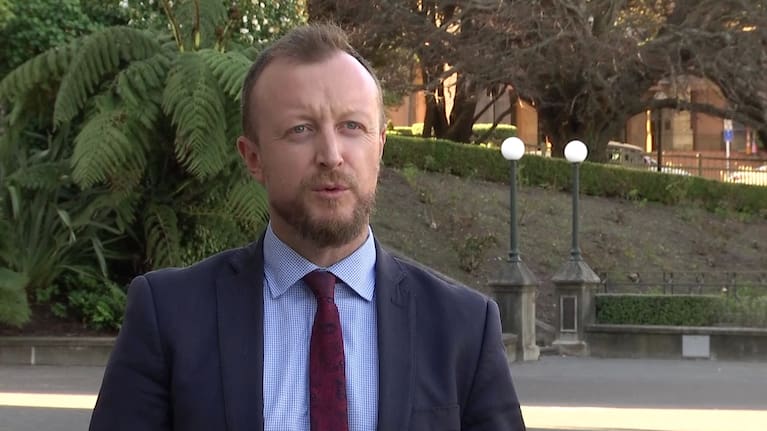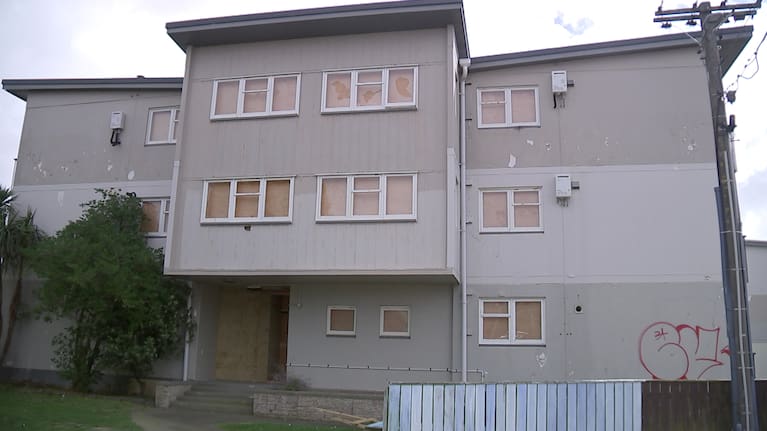Kāinga Ora's chief executive Matt Crockett says that he wants to dispel the myth that the Crown agency is being gutted.
Housing Minister Chris Bishop revealed in written Parliamentary questions that Kāinga Ora's housing stock is forecast to decrease over the coming year.
In the 2024-25 financial year the agency had 78,204 houses in its managed stock, but that number is set to decline to 78,027 for this coming year – a net loss of 177 homes.
That's despite Bishop setting Kāinga Ora a goal of delivering 420 net social housing places within the same time frame in his letter of expectations to them.
'Always regrettable' - Kāinga Ora houses boarded up as homelessness rises - Watch on TVNZ+
Crockett still believed it is on track to meet that goal.
"In the coming year we've got well advanced plans and we're contracted to be able to deliver the outcomes that we've committed to including what Mr Bishop spoke to," he said.
"And really, as we move forward, we're moving into a period where we're going from net growth in the social housing stock to a period where we're going to be holding that at about the 78,000 houses and moving into a real period of renewal and retrofit to really fix up a bunch of the older houses that we've got."

When asked about why the managed stock was decreasing for the coming year, Crockett said it had been well signalled.
"As we move into this next period consistent with the reset plan that we communicated over the last year, we're moving into a period where we're going to hold the stock at about 78,000. Now you'll see that bounce around a little bit because it depends on the timings of the build, the demolitions, etc. We still have a lot of tenants that come and tenants that go so we've still got a large capacity to house tenants."

Labour's housing spokesperson Kieran McAnulty said the 420 housing places aren't nearly enough.
"Everyone can see that homelessness has grown. Frontline providers are telling us that this government has overseen an unprecedented rise in homelessness," he said. "All the while, Kāinga Ora is going backwards in the number of houses that they've got and they think that we should be impressed that they're going to build 420 when homelessness has gone up by an unprecedented amount."
He added: "Let's not forget that up until the last election, Kāinga Ora were building a record number of state houses the most since the 1950s. Then the National Party got into government. Those numbers have fallen off a cliff and they think it's worth celebrating that the numbers are going to stay there or thereabouts. It's nowhere near enough. Homelessness is growing. People are in desperate needs of homes."

But Bishop said the Government is increasing social housing places outside Kāinga Ora.
"I'm advised that the figure they're looking at is explained by the fact that some leases are actually expiring that Kāinga Ora has, but actually they are continuing to build right around the country and of course social housing is broader than just Kāinga Ora.
"We also are delivering over 1500 new community housing places that was funded in Budget 2024 and an additional 550 in Auckland alone that was funded in last year's Budget for delivery by the end of next year as well."
Kāinga Ora housing complexes boarded up, graffitied

Earlier this year, Kāinga Ora revealed that it would cancel some housing projects and sell a fifth of its land as part of a turnaround plan.
The cancellation of these projects mean nearly 3500 homes won't be delivered.
1News today visited some of the sites that have had projects cancelled or sold off.
In Wellington's Strathmore Park 41 units were in the pipeline for Ngatiapa St. Currently the street is filled with five empty, boarded-up Kāinga Ora housing complexes, including two large unit blocks in the cul-de-sac.
Some of the houses have graffiti on them.
But Kāinga Ora has said it's not proceeding with a plan to develop those units.
In Auckland's Freemans Bay Kāinga Ora is selling off a large unit of pensioner flats. Ryle St is home to 28 one-bedroom units and most of those are also boarded up.

A real estate listing, which does not mention the units are currently owned by Kāinga Ora, said the block is on the market for the first time in 20 years.
Asked what he thought about the number of boarded up Kāinga Ora properties across the country, Crockett said: "Obviously we don't like it when that's the situation that's there so those have been part of this review that we've done. Some of them we're approving will go ahead, some of them we're deciding actually, this doesn't make sense and we should actually sell that property.
"Others are in a little bit of a holding pattern because we think we'll need it, but not just yet, and that's always regrettable but we're trying to minimise that."

McAnulty said the impacts are being felt by many communities.
"Right across the country you can see examples of houses that are boarded up that people could be living in but they're not. Sections that have been cleared that would have been built on that have been stopped or communities that were promised homes and have now had them cancelled.
"You've got places like in Invercargill that they are selling houses with no plans to build so they're going to go down where I'm from in Wairarapa in the Tararua District, the plans that were in place there, they're not happening. Every community in the country is basically impacted by the government's decision to cancel 3500 house builds and there wouldn't be many tradies in the country that are not impacted by that decision."

Bishop said he too is concerned about the number of boarded-up homes.
"It's not a new problem either. I mean, when I was in the opposition housing spokesperson, I was very frustrated at the number of houses you'd see around the place that were vacant for years and years, not unoccupied. They hadn't been retrofitted. So, I've said to Kāinga Ora that has been a real problem. And I want you to either retrofit the house, or at least put in place a renewal plan for the house, or sell it, because in some cases, these houses are just simply uneconomic for Kāinga Ora to continue to own."
He acknowledged communities are frustrated.
"We're actually making quite a bit of progress on making sure that there is minimal vacancy rates as well, because that also drives people pretty nuts when they see a Kāinga Ora house on their street. And they know that there's real housing need out there, but there's no one actually living in the house. So we have made some quite good progress on minimising the vacancy rates as well. But I fully acknowledge that no one wants to see kind of boarded up houses left there for months or years on end. And I want to make sure we sort it out."

Crockett defended the decision to cancel some of the projects, telling 1News some of them weren't viable and the prices for each spot were high.
"The cold hard truth is a lot of those projects actually weren't very viable in a commercial sense or at least I'm pretty sure that the New Zealand public wouldn't think it's sensible that we continue with projects that are going to have $1 million-plus per apartment."


















SHARE ME